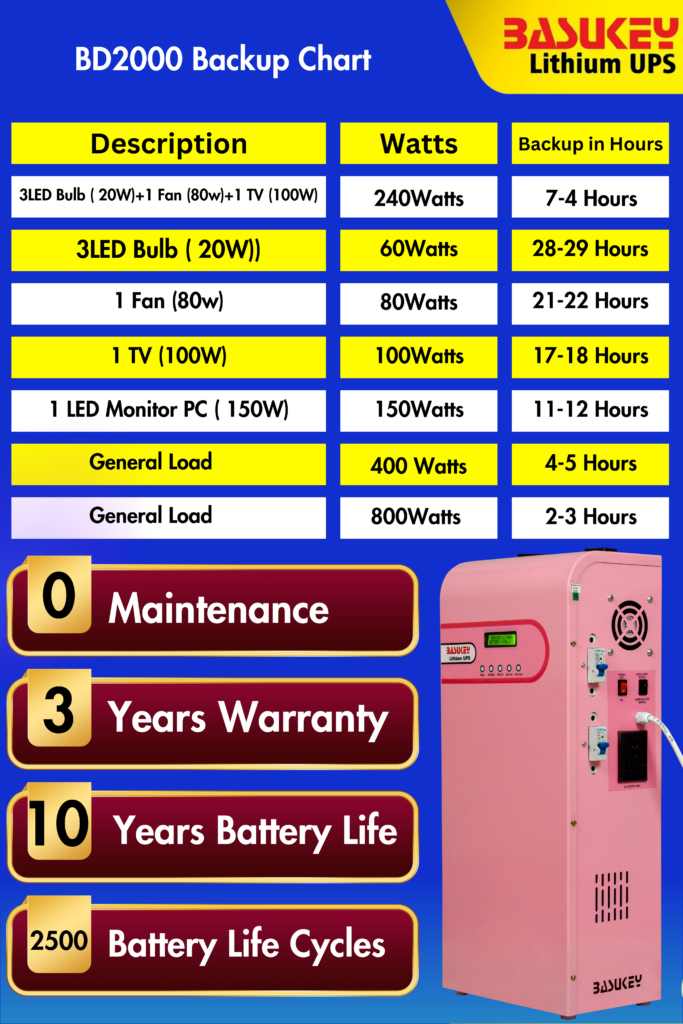Why Lithium Batteries Are Revolutionizing UPS Systems?
In a world where reliable power is critical, from hospitals to data centers, Uninterruptible Power Supply (UPS) systems serve as a lifeline during power outages and electrical disturbances. Traditionally, UPS systems have relied on lead-acid batteries to provide backup power. But with the rise of lithium-ion batteries, we’re seeing a dramatic shift in how we think about energy storage and power continuity. Here’s why lithium batteries are revolutionizing UPS systems, making them more efficient, reliable, and sustainable.
1. Longer Lifespan and Durability
One of the most compelling reasons for the shift to lithium-ion batteries is their remarkable lifespan. Compared to traditional lead-acid batteries, which typically last around 3 to 5 years, lithium batteries can last up to 10 to 15 years. This means less frequent replacements and fewer interruptions to maintenance schedules, ultimately reducing the long-term costs and hassle for businesses and institutions.
Imagine a hospital where critical medical devices rely on UPS backup. Having lithium batteries ensures that these systems won’t need frequent battery replacements, reducing the risk of failures and improving overall reliability. This longer lifespan also makes lithium batteries a sustainable choice, as fewer batteries are used and discarded over time.
2. Faster Charging for Greater Readiness
In emergencies, speed matters. Lithium-ion batteries charge much faster than their lead-acid counterparts. This means that after a power outage, a lithium UPS system can be ready to provide backup power in a fraction of the time. For businesses that experience frequent power fluctuations, this fast recharge capability ensures that the system is always prepared for the next outage.
Think about a data center where servers manage critical information for thousands of users. If the UPS system takes too long to recharge, the facility may be left vulnerable to another power disruption. With lithium batteries, the system is back online faster, ensuring data protection and operational continuity.

3. Smaller Size, More Power
Lithium batteries are significantly smaller and lighter than traditional lead-acid batteries, yet they pack more energy into a smaller footprint. This means businesses can install more compact UPS systems without sacrificing performance, freeing up valuable space in server rooms or medical facilities.
In a crowded environment like a data center, where every square foot counts, using lithium-ion batteries means more room for additional equipment, or simply a less cluttered, more organized setup. It’s a solution that balances power needs with space efficiency.
4. Energy Efficiency and Cost Savings
Lithium-ion batteries are also more energy-efficient, meaning they lose less energy during use and charging. Over time, this increased efficiency leads to lower electricity costs, which is a significant advantage for businesses running large-scale operations.
For instance, a manufacturing plant using lithium batteries in its UPS system will not only experience fewer outages but also benefit from lower energy consumption over time. This adds up to substantial savings in energy bills and operating costs, making lithium a smart financial investment.
5. Greater Reliability and Safety
One of the concerns with traditional lead-acid batteries is their maintenance requirements and risk of failure. Lead-acid batteries are sensitive to temperature changes, require regular maintenance, and can degrade more quickly if not properly cared for. In contrast, lithium batteries are more robust and require minimal maintenance. They are less affected by environmental factors like temperature, making them highly reliable in various conditions.
This is especially important in critical settings such as hospitals or emergency response centers. The last thing you want is a backup power system that fails when it’s needed most. Lithium-ion batteries provide that extra level of reliability and peace of mind.
6. Eco-Friendly and Sustainable
As the world pushes toward more sustainable practices, the environmental impact of our technology is under scrutiny. Lithium-ion batteries are a more eco-friendly option compared to traditional batteries. They have a longer lifespan, meaning fewer batteries are needed over time, and they can be recycled more efficiently.
By switching to lithium UPS systems, businesses not only reduce waste but also lower their carbon footprint, contributing to a more sustainable energy landscape. It’s a win-win for both the planet and the bottom line.
Conclusion: A Game-Changer for Power Backup
Lithium batteries are transforming UPS systems by offering longer life, faster charging, greater efficiency, and enhanced reliability. Whether it’s for safeguarding critical infrastructure in hospitals, ensuring data protection in tech companies, or providing consistent power for industries, lithium-ion technology offers clear advantages over traditional lead-acid batteries.
As we move into a future where reliable and efficient energy storage becomes increasingly important, lithium batteries are leading the way. They not only enhance the performance of UPS systems but also contribute to more sustainable, cost-effective power solutions. In the end, it’s all about ensuring that power is always there when you need it most—and lithium is making that possible.
